By BETSY TAYLOR It isn't often that a group of oncologists is spotted alongside a herd of cattle or trekking past cornfields, as was the case outside of Sioux Falls, S.D., on July 10. The doctors were among the Avera Health executives and health care providers who toured a family-owned farm, part of an effort by the Catholic health care system to understand how to better link patients from rural areas with cancer screenings to support early diagnosis and to provide the most up-to-date cancer treatments.
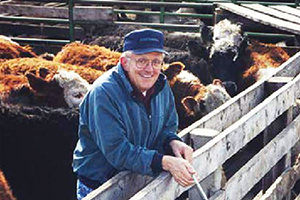
Jim Woster, co-chair of Avera's Rural Cancer Advisory Board, worked appraising and buying and selling livestock for years. His advisory board role includes listening to rural residents, whose input will inform Avera's work to improve their cancer-related care.
The group toured Hexad Farms near Parker, S.D., where Walt Bones, a former South Dakota Secretary of Agriculture and fourth generation farmer, showed them around his family's grain and livestock operation as the health care providers tried to get a better understanding of how a modern farm works, and how the daily demands of the job might lead farmers, ranchers and their family members to delay or forgo aspects of their medical care, such as a routine screening that might lead to an early cancer diagnosis, or fail to make every appointment in a cancer treatment sequence.
Competing priorities
Information from the South Dakota Department of Health's comprehensive cancer control program "indicates patients from farm and ranch families are less apt to pursue and complete cancer treatments than those from families with other occupations," Avera Health wrote in a grant application to fund its outreach to rural patients. "Every oncologist has a tale of a farmer diagnosed with cancer around harvest time, and the hopeless look on the face of the patient as a treatment plan is described. Or the rancher's wife with a job in town, and young children, who's told she needs chemotherapy, surgery and radiation treatments for breast cancer." The system explains in its request for grant funding that treatment efficacy depends on a patient's desire and ability to comply with protocols.
At Sioux Falls' Avera Health, they're trying to better understand barriers to care for rural residents, including ranchers and farmers. Bones drove home the point that timing is critical to a farmer. Driving long distances to a medical center for a cancer screening or treatment can mean the crop doesn't get planted on time, or the harvest is delayed, resulting in reduced farm revenue.
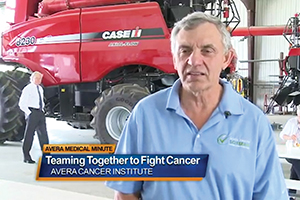
This screen shot is from the "Avera Medical Minute," which aired on a news program produced by Sioux Falls, S.D.'s KSFY-TV. It shows farmer Walt Bones in the foreground. He led Avera Health executives and health care providers on a tour of his family's farm near Parker, S.D. In the background is Dr. Brian Leyland-Jones, director of molecular and experimental medicine at Avera McKennan Hospital & University Health.
"I think maybe we ingrained in them how much is at risk when a crop is in the ground," Bones said of the tour group. "When it's ready to go, it's ready to go."
As part of the outreach efforts, Avera McKennan Hospital & University Health Center in Sioux Falls is forming the Avera Rural Cancer Advisory Board, bringing together about 15 to 20 farmers, ranchers, other rural residents and care providers to identify the needs of rural patients and to advocate for the expansion of new treatment options, including treatments involving genomic medicine.
In May, the health center received a $200,000 grant from the Bush Foundation — established in 1953 by 3M executive Archibald Bush and his spouse Edyth — to further the health center's outreach and to eliminate barriers to treatment options for rural residents. Eliminating barriers to care could make a big difference to many families. The South Dakota Department of Agriculture said the state had 31,700 farm operations in South Dakota with an average farm size of 1,366 acres in 2014.
Stepping up personalized medicine
Busy rural residents located a long distance from medical centers may delay their doctors' appointments, but physicians say farmers' and ranchers' working knowledge of genetics often means they're greatly intrigued when personalized medicine is offered as a treatment option.
Dr. Brian Leyland-Jones, a researcher and physician, and Casey Williams, who has his doctorate in pharmacy, both joined Avera Health last year to lead molecular and experimental medicine at Avera McKennan Hospital & University Health. Their charge includes expanding cancer research and the hospital's personalized medicine program, the latter by customizing drug therapies to achieve the maximum benefit for individual cancer patients. Leyland-Jones is vice president and Williams is director of the program. Both men took part in the recent farm tour.
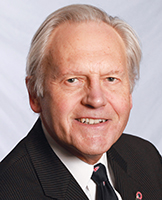
Leyland-Jones
They built the genomic oncology team to 44 employees from 11 in the past year, they said. The increased focus on genomic oncology is under way at the health system's Avera Cancer Institute's five locations in Sioux Falls, Yankton, Mitchell and Aberdeen in South Dakota and Marshall in Minnesota. By studying healthy and cancer tumor DNA from a patient, clinicians aim to devise the most effective drug therapies for individual patients. About 350 Avera patients have had genetic sequencing done to better tailor their treatments, the men said.
Williams, who grew up on a dairy farm, and Leyland-Jones said their rural patients, particularly farmers and ranchers, usually have a solid understanding of genomics, because they're in an industry that involves genetics in a number of ways, whether testing the microbial diversity in their farm soil, needing to understand the genetic makeup of the seeds they plant, or genotyping their livestock for healthy, productive herds.
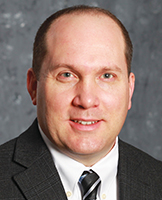
Williams
That often translates into patients interested in personalized medicine. "They get it immediately," Leyland-Jones said. And that often makes for patients deeply committed to using personalized medicine for their care. He finds his patients who understand genomics understand the need "to go all out" in attacking their cancer. Sometimes a patient on an arduous triple therapy of treatments may seek to drop one. He finds patients who understand genetics understand "the need to hit every genomic driver, to take the drugs in combination."
Listening to communities' needs
Robin Prunty, vice president of the Avera McKennan Foundation, the charitable foundation that provides support to the hospital, said through the Rural Cancer Advisory Board, "We're going to look at access to care, as well as barriers to care. Is it transportation? Is it cost? Or is it that they're too busy farming to get the care they need?"
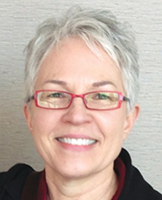
Prunty
Jim Woster, co-chair of the Rural Cancer Advisory Board, whose past agriculture work included appraising and buying livestock, said advisory board members plan to visit rural communities, inviting residents for a cup of coffee, to determine what resources are available in rural areas and what more is needed. They'll ask: Do areas want cancer support groups? Will people want transportation options to and from chemotherapy or radiation treatment? Over half of the cancer patients at the Avera Cancer Institute in Sioux Falls live more than 150 miles away, said Leyland-Jones and Williams.
Woster said self-sufficient rural residents may struggle to ask for help from neighbors. But, he said, that might change if the outreach work leads to the formation of a network of volunteers eager to assist their neighbors undergoing cancer treatments. Neighbors might tell a weary patient: With your permission, we're going to do your chores for a few days.
The health system also is establishing a new call center, to provide telephone support to its cancer patients 24 hours a day (see sidebar).
The underlying question for the advisory board to answer, Prunty said, is, "What will it take to give every patient equal care?"
| Avera Health to open cancer patient call center Avera Health is gearing up to open a cancer call center early next year, so patients and their home caregivers can dial in any time of day or night when they have concerns or need assistance. The Avera Cancer Institute Navigation Center is being funded through philanthropic support. More than $1 million dollars has been raised toward the $2.3 million needed to open and operate the center for five years, said Kris Gaster, assistant vice president for the Avera Cancer Institute's outpatient cancer services in Sioux Falls, S.D. Robin Prunty, vice president of the Avera McKennan Foundation, said the health care system often hears from patients who say they had unexpected questions but hesitated to call a doctor after business hours, and from family and friends who didn't know if their loved one facing an acute health crisis should be taken to an emergency room, especially when the nearest hospital is far away. Call center staff will assist with those decisions. The nurses and social worker staffing the service also will respond to questions about cancer diagnoses, and they will provide information about cancer care resources and the management of side effects of cancer treatment, Prunty said. Avera Cancer Institute Navigation Center staff will also be able to make calls to patients after a cancer diagnosis to answer questions and they can link patients to an Avera Health oncologist or radiologist. The call center service will be available to patients within the states where Avera Health operates — South Dakota, North Dakota, Nebraska, Iowa and Minnesota. The new call center will be located in Sioux Falls. Avera Health plans to hire a director, two nurses, a social worker and an administrative assistant. Avera Cancer Institute Navigation Center employees will answer calls from 8 a.m. to 8 p.m. Avera McKennan Hospital & University Health Center in Sioux Falls already has a call center at the hospital to answer health questions, and nurses there will answer questions from 8 p.m. to 8 a.m. and on weekends. A shared software program between the call centers will allow for coordination between call centers, Gaster said. |
Copyright © 2015 by the Catholic Health Association
of the United States
For reprint permission, contact Betty Crosby or call (314) 253-3477.